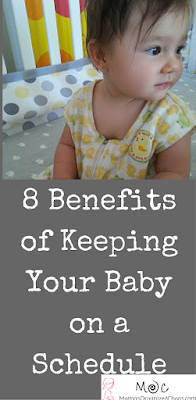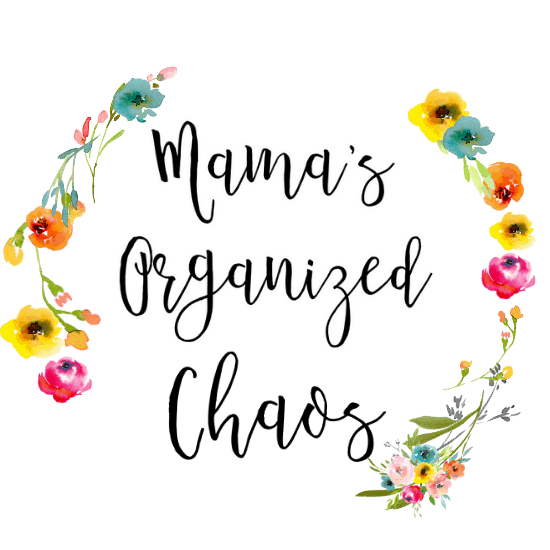
When I was pregnant, I did a lot of research on 2 main things:
1. How often/how much babies eat
2. How many diapers they’d need per day
As a first time mom, I wanted to be prepared and know what to expect. I wanted to have enough supplies on hand and be mentally “ready” (if you can be) for at least these 2 major parts of baby’s daily routine.
I also knew that I was not going to immediately know what her different cries meant, meaning that I needed to be able to anticipate what the cries meant simply based on timing.
As I did my research, I ran into a couple of main ideas regarding feeding:
1. Feeding on demand
2. Feeding on schedule
Initially, I was leaning towards feeding on demand for the first few weeks.
I felt that, since I was breastfeeding, I would need to give food on demand in order to keep my supply up, and to make sure she was getting enough food (since I wasn’t going to be able to measure the ounces she was eating).
I also saved a few schedules, however, because I loved the idea and predictability of keeping her on a schedule throughout the day.
When it came down to it, we never ended up feeding on demand. Because she was born early (at 37 weeks), our doctor recommended feeding every 2 hours around the clock until her weight was up.
I am so glad we got this advice in the hospital, because we naturally fell into a schedule and a great rhythm.
I am now a HUGE advocate of keeping babies on schedules.
Here are the main benefits that I have seen to keeping your little one on a schedule (even if breastfeeding):
1. It lessens the detective work when baby is crying
When Caroline cries, I know it is not because she is hungry (unless she is going through a growth spurt).
And, because we also keep her naps on schedule, it is very obvious when she hasn’t had enough sleep.
When she is crying, I can generally rule out hunger and I already know, before she does, if she’s going to be overtired. I can anticipate any issues that arise with hunger and tiredness in advance, and address them before they are even bothering her.
2. Baby will be well fed
There are easy guidelines to follow with different age ranges and lots of resources out there. I knew that as a newborn she was going to need to be fed a minimum of 8 times throughout the day.
When you schedule those 8 feedings and keep track of them (instead of waiting on your baby to tell you when she’s hungry), you can be sure to get all of the feedings in.
Your baby will also get used to the schedule and get full feedings in, as opposed to snacking all day long.
3. It helps to keep up your supply (for breastfeeding mamas)
If you are nursing (or pumping) at scheduled intervals, it actually helps to regulate your supply. If you wait until baby asks for it, two things could happen:
– If baby goes long intervals without asking for food, you could get engorged throughout the day, which could then cause a fast letdown. This, in turn, could make nursing difficult for baby- especially in the early months when you are first establishing good nursing habits.
– If baby goes short intervals, however, and is nursing all day, you could overstimulate your supply, and your nipples might not be able to handle it.
This could also cause your baby to not get full feeds and to only be consuming foremilk instead of taking nice, long feedings and getting the good fuller fat hindmilk that comes towards the end of a feeding.
4. You (or the bottle) will not be used as a pacifier
Babies cry. Often when they cry, parents assume that they are crying out of hunger. With a schedule, it takes the guess work out, and you won’t end up feeding them at every cry.
You won’t end up feeling like a pacifier (if nursing), and your baby won’t get used to just eating for comfort. She will eat when she is hungry.
5. Babies love routine
Babies actually thrive on routine. They learn routines very well and know what to expect. Isn’t your day so much easier to tackle when you know what to expect? Babies feel the same way!
It is human nature to like the comfort of predictability. If you find the schedule that is right for your baby, your baby will be well fed, well rested, and happy during their wake time.

6. Mamas love routine
I was dreading getting caught out in public breastfeeding. It’s fine for those that don’t mind it, but I wanted privacy and to be comfortable when I was breastfeeding.
I have literally only had to breastfeed in public 3 times. (We go out every day by the way, and have since Caroline was about 4 weeks old. Caroline is now 9 months old.)
I know when I can leave the house, and I know that my baby will not be asking for food while we are out. It has made for a lot less stress for me, knowing what to expect.
7. Babies sleep through the night sooner
Babies that get enough food and enough sleep throughout the day sleep better at night.
If your baby is overtired, nighttime sleep is going to be a challenge.
If your baby is hungry, she is going to wake in the middle of the night for food.
It is that simple.
If you can create a schedule that allows her to get enough food and sleep during the day, nighttime will fall into place sooner and more easily.
Caroline was sleeping through the night when she was 4 months old, and she was only waking out of habit during the 3rd month (not out of hunger).
8. You are creating an environment in which baby can learn
If your baby is well fed and well rested, and she will be if she is on a schedule that is right for her, she will be awake and happy during playtime.
This allows her to be in a state in which she will be ready to learn. We know it is much easier to absorb information when we are not tired and hungry. The same applies to your baby.
You’ll notice that I keep mentioning “a schedule that is right for your baby”.
There are a lot of rumors out there about how schedules are bad for babies- especially if you mention the term Babywise.
I’ve even heard rumors so drastic that they imply you are starving your baby if you put her on a schedule. Those rumors stem from schedules being misunderstood.
It is not a good idea to simply impose a schedule on your baby and not listen to their cues. Babies go through growth spurts, and they are simply all different in what they need.
I always tell people that Caroline builds her own schedules. I provide a starting point. I literally started by making a schedule (based on research) and trying it. But I then watched Caroline and all of her cues.
Get Your Printable Schedule Here:
Was she telling me she was hungry before her next scheduled feeding time? Was she tired before her nap time? Or was she not tired enough when it came to nap time? It is very important to watch your baby and adjust the schedule to fit her needs.
Babies will always tell you what they need. I observed her over the course of a few days, adjusted and tweaked her schedules until I felt they were a good fit for her.
Once we found the right fit, we kept the schedule until I noticed it wasn’t working any longer. We then took the time to reevaluate and adjust the schedule again.
Sometimes that meant dropping a feeding, dropping a nap, extending a wake time, extending a nap time, etc. A schedule usually lasts us about a month before it needs a small tweak here and there.
To find a starting point for your baby, check out the baby schedules page on this blog. This page shows the schedules that we used at each age by month, and gives a detailed description of how they were working, along with information on night wakings, naps, food and wake time activities.
They are great starting points, but remember, you may need to tweak the times a bit to make it a perfect fit for your little one!
A schedule for your baby is feeding them at the same times every day, providing them with the same wake times, and naps times every day.
Schedules refer to a time that you do something with your baby (feed them or put them to sleep). Routines refer to the patterns throughout the day (doing an eat, wake sleep cycle each day, or having bedtime routines. These are the same sequence of events that happen, but can occur at different times.









